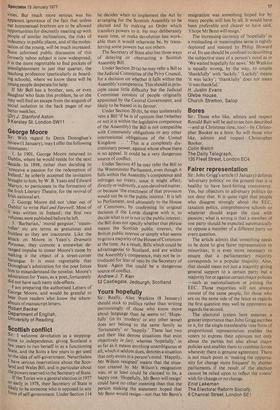Scottish conflict Sir : I welcome devolution as a steppingstone to
independence, giving Scotland a few years to run herself in as a functioning State, and the Scots a few years to get used to the idea of self-government. Nevertheless I have serious reservations about the Scotland and Wales Bill, and in particular about the powers reserved to the Secretary of State.
If the Tories win a general election in 1977 or early in 1978, their Secretary of State is likely to be someone who is opposed to any form of self-government. Under Section 114 he decides when to implement the Act by arranging for the Scottish Assembly to be elected and by making an Order which transfers powers to it. He may deliberately waste time, or make devolution less workable than it would otherwise be, by transferring some powers but not others.
The Secretary of State also has three ways of delaying or obstructing a Scottish Assembly Bill.
Under Section 20(a) he may refer a Bill to the Judicial Committee of the Privy Council, for a decision on whether it falls within the Assembly's competence. This should in principle cause little difficulty but the Judicial Committee consists of people originally appointed by the Central Government, and likely to be biased in its favour.
Under Section 20 (b), he may unilaterally veto a Bill `if he is of opinion that (whether or not it is within the legislative competence of the Assembly) the Bill is not compatible with Community obligations or any other international obligations of the United Kingdom . .' This is a completely discretionary power, against whose abuse there is no appeal. It could be a very dangerous source of conflict.
Under Section 45 he may refer the Bill to the Westminster Parliament, even though it falls within the Assembly's competence and infringes no treaty, since it might affect, directly or indirectly, a non-devolved matter, or because 'the enactment of that provision would not be in the public interest.' It is left to Parliament, and ultimately to the House of Commons, by confirming its original decision if the Lords disagree with it, to decide what is or is not in the public interest ; the Bill does not specify whether that phrase means the Scottish public interest, the British public interest or simply what seems to go to a majority of the House of Commons at the time. As a result, Bills which could be advantageous to Scotland, and are within the Assembly's competence, may not be introduced for fear of veto by the Secretary of State. Again this could be a dangerous source of conflict.
Andrew J. T. Kerr 52 Castlegate, Jedburgh, Scotland


































 Previous page
Previous page